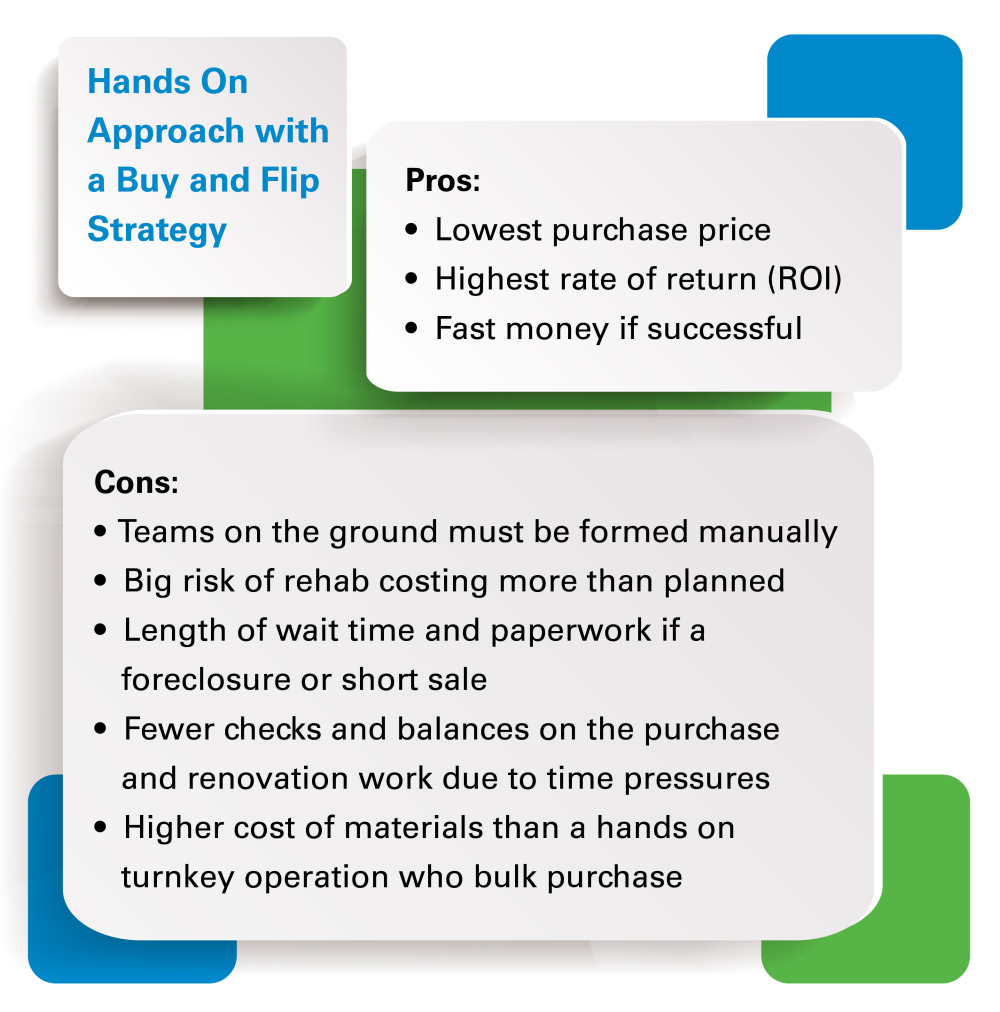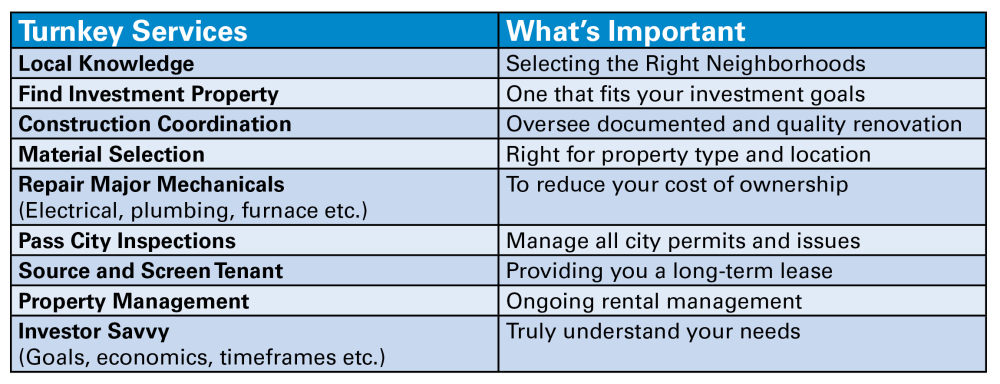Making It Happen
Hands On or Off
You’ve defined your goals, both short and long term. You’ve selected a strategy and personalized your plan of attack, but you still need a way to get there, don’t you? You need a vehicle to get where you want to go. You can be a “hands on” investor or you can work passively and be “hands off” with a turnkey operation. Let’s look at both.

Hands On Investor
For the startup real estate investor this might be your preferred path. You’ve defined your goals, selected a buy and flip strategy and established a team with a real estate agent, loan officer and general contractor. With your new team you’re ready to go find a property that is under market and determine whether or not you can make money selling it. But to get from Point A to Point B there are a lot of moving parts.
Your first approach is finding the property you want to acquire. Your real estate agent will search for homes based upon your criteria. You can visit the county recorder’s office to look for foreclosure notices or attend a foreclosure auction. While you’re there, you can research any property tax lien sales and invest in property tax lien certificates.
Most banks and mortgage companies today have their own Real Estate Owned, or REO department which is a division the lender really doesn’t want to have. It’s an inventory of foreclosed homes that didn’t sell at the foreclosure auction and are now listed for sale to the general public. Fannie Mae and Freddie Mac also have their own national database of thousands upon thousands of foreclosed properties for sale nationwide.
However you find your first prospective purchase, along with your real estate agent you will establish a buy price and what the home will ultimately sell for after any needed repairs are completed. Before you can estimate how much those repairs will cost you must visit the property with a property inspector and a contractor who will provide you with a bid to repair, remodel or rehabilitate.
If the final sales price less selling expenses, less repair costs less buy price is enough to turn a profit, you have your first project. There is a lot of work to be performed before you pocket your profits but at the same time those very people on your team are committed to a successful close. They want you to buy and sell as many homes as possible and will work their ultimate best to ensure that success. Why? Because each time you close on a deal they all make money. And you were there every step of the way. Let’s review the hands on approach for executing a Buy and Flip strategy. Buy and Flip Strategy with a

The Turnkey Solution
Or, you’re not there every step of the way. You don’t yet have a team or you’ve decided you don’t want one because you’ll let other professionals do the work for you. All you need to do is provide the funds, all or in part.
There are real estate investment firms that research, evaluate, rehab and sell distressed properties. They do all the heavy lifting and all you do is evaluate the opportunity and if you like the project you can invest in it. You can execute a buy and hold strategy for example and own a rental property without doing all the work that a “hands on” approach requires. A turnkey investor is someone that wants to invest in real estate but doesn’t have the time or perhaps the inclination or even physical ability to fix and buy and flip or buy it, fix it and hold it. There’s no need to quit your day job and is a way to get your toes wet so to speak investing in real estate.
When evaluating a turnkey proposal, it’s the numbers and team that matter the most. You’re trusting the math of others that you’ve never done business with. Does the project make sense and are the profits legitimate? Successful turnkey investment firms will have a broad list of successful transactions. Once convinced, all that is needed is your investment. But do your homework. Get referrals, look at recent projects and perform your own due diligence on the partner’s history and their turnkey services. Here is a list of services a turnkey operation should look to provide:
Turnkey Real Estate Investment Services

Your returns will be lower compared to a similar hands-on project because the turnkey firm takes a nice fee for putting the deal together. However if you leverage finance and get a great cap rate in the first place you can be double digit cash on cash returns with little effort on your part compared to hand on. Lets review hands off investing:
Hands Off Approach with a Buy and Hold Strategy

These are essentially the two main approaches to executing your strategies —do it yourself or be more like a bank and provide the capital for a turnkey project.
Gary Buys a Turnkey Property Out-of-State
Austin, Texas is one of the fastest-growing cities in the United States. When Gary decided he wanted to buy a rental property he called up his real estate agent and told him he was ready to buy and be the landlord since he lived locally. He was handy and enjoyed small home projects. Well, after searching for two months Gary realized finding property that met his criteria was more difficult than he thought. Since property taxes are relatively high in Austin he had to find something in a good school district that would command slightly higher rent, which was not easy to come by.
Gary’s agent told him not to fret and asked, “What about buying in another state?” Gary said no way—it was too expensive and he couldn’t fix anything if something broke. His agent told him about a property he owned in Indianapolis, Indiana. He acquired the property from a man who runs a typical turnkey operation—he buys distressed houses, fixes them and then sells them. Gary wasn’t sure at first because he couldn’t be the landlord. His agent told him to “buck up” and at least talk to his partner in Indianapolis to see if it was right for him.
Gary researched the area before making the call:
What is typical rent for the neighborhood?
What is the crime?
How are the schools?
What are the demographics—average income, population growing or shrinking, vacancy rate, unemployment
After a few email exchanges he decided to call. He had a list of questions that he thought could be answered better via a telephone conversation:
- Tell me about your business and how you started selling turnkey properties.
- How many properties do you usually have at any one time?
- Do you only have one contractor who fixes the properties or do you bid out each job?
- Do you have a breakdown of the work and costs associated with repairing the property I’m looking at? Before and after pictures?
- Is there a warranty on the appliances and workmanship, and if so how long?
- What are my financing options?
- Do you have references?
- Do I have to find my own property manager?
After a long discussion with the agent in Indianapolis and his own research on the area, he decided to purchase a turnkey property because he didn’t live in the area and couldn’t manage or repair it. He knew his returns were slightly lower but still way higher than if he bought in Austin.
What he didn’t realize was that it took a few months before everything was flowing smoothly. As with many projects there are some unforeseen things that can pop up. Gary had an issue with the county’s assessment of the property taxes so he had to hire an outside firm to fight for a lower assessment on the taxes (he got help from the seller). He had to install an alarm system because he knew his property was in a neighborhood with crime. A few months after the purchase, he wasn’t so sure about his decision. He was in the worry zone (see chart). He started second-guessing himself and thought that if he bought locally he could manage the property every step of the way. He wasn’t losing money yet and knew he did his due diligence so he decided to stick it out. Lo and behold it turned out to be a good thing after all. He had built a positive rapport with his partner in Indianapolis and knew what type of market he bought into. After nine months he knew he had found an excellent partner and purchased another property from him. It was all about buying where the return was best and working with a credible partner.
SUMMARY
- Even if you have the time and ability to research, fix and manage your own property you may have difficulty finding a property in your area to own
- Thorough research always pays off, whether or not you buy the property
- Understand that issues arise and prepare for them both mentally and financially

